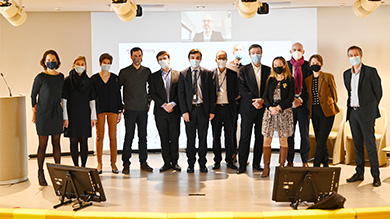The issue of access to clean water affects two billion people worldwide, and in light of this issue, Natixis is taking a range of actions.
Two billion people worldwide do not have secure access to clean water supply, while 4.5 billion do not have access to sanitation facilities i.e. six out of ten in the poorest countries. The 2019 United Nations World Water Development Report highlights this tragic reality, and in Sub-Saharan Africa in particular, only one in four has access to clean drinking water, with the most fragile groups in the population – who collect water from tanker vehicles or street sellers – paying ten times the price that richer members of society pay. They can sometimes have to spend as much as a third of their revenues on water just to have the bare minimum.
As inequality increases, so the fundamental right to clean water is affected, and this crisis is getting worse due to climate change and displacement of communities. We are also seeing a surge in conflicts directly related to water, going from around 100 between 2000 and 2009 to more than 260 today. The United Nations report highlights States’ duty to ensure better access to water by setting aside greater financing for this infrastructure and acting more quickly. It also draws attention to the impact of climate change on water availability.
This is a worldwide challenge and financial companies like Natixis are playing a role by taking several initiatives.
Financing major projects
Investors are now more interested in infrastructure in the broadest sense of the word than ever before.
In 2014, capital raised for investment in this sector came to €34bn, while the amount had soared to more than €80bn by 2018. There is particularly strong interest in sustainable long-term infrastructure, but these essential services require long-term visibility. “Yes, there is definitely a great deal of interest but there can also be a great deal of country-specific risk” notes Stéphane Carrière, Co-Head of Transport & Social at Natixis’ Corporate & Investment Banking arm. “This is particularly the case where needs are the greatest. Our role is to enhance projects’ credibility as we adopt a process to analyze all aspects of the investment. We ourselves must be convinced that the project makes sense, that it is sustainable and that we can then convince our financial partners.”
In the water sector there is no shortage of country risk or difficulties. “Sometimes it is difficult to develop bankable set-ups for certain public projects”, notes Stéphane Carrière “and for a long time water-related infrastructure projects were managed directly by the public authorities. However, public-private partnerships now allow for more efficient development with a better risk balance between the parties. It all depends on the country – each project must be assessed specifically with an analysis of risks, the developer’s credit profile and the country that is involved. Emerging countries are attracting increasing amounts of interest and in Africa there are huge infrastructure requirements. A coordinated drive with multilateral agencies is often required to develop new programs.”
Some projects pave the way for visions that had previously been unimaginable. Access to water is particularly critical in the Middle East and several local initiatives aim to tackle the issue, such as the Vision 2030 program in Saudi Arabia, which aims to garner funds to develop and safeguard resources. Political determination has led to a process providing a clear and steady framework, with the launch of several calls for tender for Independent Water Projects (IWP), attracting interest from several industrial players and investors. Major sea water desalination projects have therefore been developed, such as the expansion of the Shuaibah site and more recently Rabigh 3, two projects where Natixis supported one of the bidders and set up the financing.
“Appropriate financial engineering and stable counterparties help hedge risks to set up and syndicate financing” explains Stéphane Carrière. “The amounts of funds raised reflect investor interest in this type of deal, with a guarantee of stable assets over a 30-year timespan. The next shift in the market now is to use solar resources to provide power for these sites with the aim of further promoting sustainable development”
Investing in companies that safeguard water resources
“It’s no exaggeration to say that access to water is an emergency” notes Arnaud Bisschop, senior thematic fund manager at Thematics Asset Management, and a graduate of the École Polytechnique et de l’École Nationale du Génie Rural, des Eaux et des Forêts (ENGREF) with an unusual profile. He develops a fund including listed companies that are active in water and waste management.
“We have known for a long time than there is severe under-investment in water infrastructure, but the situation is really coming to a head at different places across the globe. Developing countries are not the only ones to suffer, as shown by record droughts in some towns and cities in California in 2016, and around the Cape area in South Africa in 2018. According to a recent report from the World Bank and UNICEF, if we want to address the issue of basic security for clean water services, we would have to double investment in cities and increase it as much as tenfold to achieve the highest standards… this is obviously impossible”.
He believes that there is another particularly worrying figure – the 780,000 people who die each year from water-borne illness, such as dysentery or cholera. “We have failed to invest enough for a very long time, especially in collecting and treating waste water” notes Arnaud Bisschop. “With each year of insufficient investment or determination to act, new requirements are constantly increasing”.
To address this issue, Thematics Asset Management focuses on companies that provide technologies or invest for public authorities, such as Suez and Veolia “There is no easy solution” notes Arnaud Bisschop, “but we encourage companies that seek to safeguard water resources, whether via technologies that use less water, or services that avoid further pollution. On these segments, growth ranges from 4% to 15%, and we convince clients who trust us as their savings finance both projects and innovation and also help improve living conditions for a huge number of people”.
Reducing water use in agriculture
Mirova spearheads Natixis’ responsible investment efforts, and with €10bn in assets, it invests in renewable power and sustainable agriculture projects, in particular via green bonds, where the market is particularly buoyant in France.
“Water cycles are definitely set to change but it is not enough to address the issue of water resources alone. Here at Mirova, we foster a comprehensive view, which also includes climate and equality themes” explains Ladislas Smia, Co-Head of Responsible Investment Research.
Infrastructure only addresses part of the problem as 70% of water use is in agriculture, 20% in industry and 10% domestic use. So agriculture is key and this is the idea behind Mirova’s Land Degradation Neutrality (LDN) fund, launched at the end of last year with the aim of investing in sustainable agricultural practices and providing long-term financing for project developers. The first investment was selected in January 2019 by the strategic committee – Urapi Sustainable Land Use, a program to restore degraded land in Latin America. The project was developed by Quebec company Ecotierra and initially supports four coffee cooperatives in Peru, involving 2,400 producers on 9,000 hectares of agroforestry land under restoration. The fund aims to raise $300m. “The financial equation may initially seem limited” notes Ladislas Smia “but it is important to realize that taking on board sustainable development aspects does not necessarily mean hampering returns. We can use Blended Finance to bolster these projects with public investment that provides additional capital as we seek to reconcile the pursuit of yield with the quest for positive impact”. This philosophy is increasingly attracting investors.














